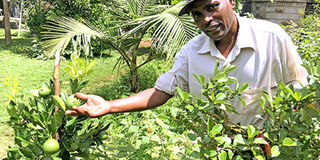We grow fruits using recycled household wastewater

Mark Muchiri, who uses recycled household wastewater to irrigate fruits and the lawn in a homestead in Karen. The water is usually tested for safety before it is given the greenlight to be used. PHOTO | BRIAN OKINDA | NATION MEDIA GROUP
What you need to know:
- Mark Muchiri, the manager at the homestead, says water is not a problem because they recycle what they use in the house and use it to grow the various crops.
- Isaac Karani, a water sanitation and wastewater treatment engineer, says there are several innovative technologies that homes and institutions can use to turn their wastewater into clean water for use not just in houses, but also farms.
- In the era of climate change and water scarcity, Karani says this is the system homes and institutions should embrace to keep their compounds clean.
- Ann Macharia, an agronomist and agribusiness adviser, notes that recycling water and using it for farming is acceptable, however, it must be tested to ascertain its safety before use.
As one enters the compound in a fairly arid section of the Karen neighbourhood in Nairobi, its lush green vegetation comes as a surprise.
A walkway leads to the main house’s front door, and on the right side of the path sits a luxuriant grass turf dotted with dozens of different types of fruit trees.
They range from mangoes, lemons, melons, passion fruit, tree tomatoes, avocados, thorn melons, pomegranates, grapes, pawpaw and bananas.
Mark Muchiri, the manager at the homestead, says water is not a problem because they recycle what they use in the house and use it to grow the various crops.
“I started growing the fruits in 2017 after the owner requested me but soon after, I ran into problems because there was no water to water the plants,” says Muchiri of the area that suffers a water crisis.
The solution, however, came in form of the water used in the household, which they thought of recycling.
“We were using a lot of water in the kitchen and bathroom and it would end up in the septic tank, which would fill up quite often. This made us spend a lot of money on exhauster services.”
The sewer water has, however, turned a blessing in disguise as it is now recycled and used on the crops and grass.
“We installed a wastewater treatment unit which cleans the dirty water before it irrigates our crops and grass,” he says.
Isaac Karani, a water sanitation and wastewater treatment engineer, says there are several innovative technologies that homes and institutions can use to turn their wastewater into clean water for use not just in houses, but also farms.
“The treated water can effectively be used not just for watering lawns, flushing toilets and cleaning motor vehicles, but also to grow vegetables in kitchen gardens and fruits.”
ERA OF CLIMATE CHANGE AND WATER SCARCITY
Karani, the director of Elikham Systems Ltd, a wastewater treatment enterprise in Nairobi, says most water treatment processes draw from a technology called sequence batch reactor.
“The system treats the water in batches rather than continuously and it is completely biological. The result of the process is much lower power consumption, very high treatment efficiency and much less risk of shock from usage.”
According to him, all the water used in the house, ranging from washing dishes, doing laundry, cleaning the house, flushing the toilets and showering, is collected into a preinstalled tank such as an underground septic tank.
The water is then pumped into the sanitisation tank where it stays for six hours as the purification process takes place.
It is then pumped into the clean water collection tank and then supplied to the flower beds, lawns or drip irrigation system.
In the era of climate change and water scarcity, Karani says this is the system homes and institutions should embrace to keep their compounds clean.
Muchiri points out that though they get plenty of fruits from their orchard, they consume all of them.
“We consume most of the fruits here and take some to members of our extended family and sometimes neighbours. The orchard remains green throughout the year because we can now afford to water it daily.”
Muchiri adds that they even collect wastewater from their neighbours’ homes and purify, then use it for their irrigation processes. He notes that the fact that the system is solar-powered means it is low cost.
Ann Macharia, an agronomist and agribusiness adviser, notes that recycling water and using it for farming is acceptable, however, it must be tested to ascertain its safety before use.
The Kenya Agricultural and Livestock Research Organisation (Kalro), the Crop Nutrition Laboratory Services Ltd, and the Water Programme Laboratory, can do the testing for those keen on recycling water for farming, she points out.
“Such water should not be used unless it is tested and certified safe. The testing exercise should not be a one-off activity but should be done repeatedly to guarantee that what the farmer uses is safe to, not just the plants, but also those who will consume the produce of the crops,” she says.





